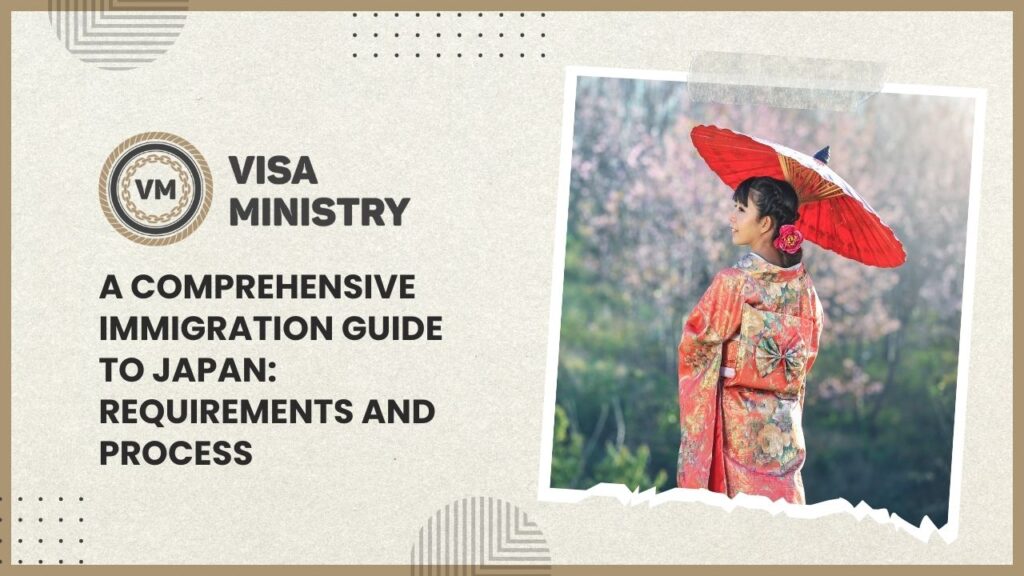Introduction to Immigration in Japan
Welcome to the land of the rising sun – Japan! A country known for its rich culture, stunning landscapes, and technological advancements. Whether you’re dreaming of studying in prestigious Japanese universities, working in bustling cities like Tokyo or Osaka, or simply experiencing the unique way of life here, navigating through Japan’s immigration process is essential.
In this comprehensive guide to immigrating to Japan, we will walk you through the various types of visas available, their specific requirements, and the step-by-step application process. We’ll also discuss common challenges faced by immigrants and emphasize the importance of thorough research and preparation. So grab your pen and paper because we’re about to embark on a journey that will equip you with all the necessary information for a successful immigration experience in Japan! Let’s dive in!
Types of Visas and Their Requirements
When it comes to immigrating to Japan, understanding the different types of visas available is crucial. Each visa category has its own specific requirements that must be met in order to obtain permission to enter and stay in the country.
The most common type of visa is the work visa, which is issued for individuals who have been offered employment by a Japanese company. To qualify for this visa, you must have a valid job offer and meet certain educational or professional experience criteria.
Another popular option is the student visa, which allows foreign nationals to study at accredited educational institutions in Japan. To apply for a student visa, you will need an official acceptance letter from your chosen school and proof of financial support.
If you are planning on starting a business in Japan, you may be eligible for an investor/business manager visa. This requires proof of sufficient funds and a detailed business plan.
For those looking to join their family members who are already residing in Japan, there is the spouse/dependent visa category. In order to qualify for this type of visa, you must provide documentation proving your relationship with the sponsoring family member.
It’s important to note that each type of visa has its own set of requirements beyond what I’ve mentioned here. It’s always best to consult with an immigration lawyer or visit the official website of the Japanese Ministry of Foreign Affairs for comprehensive information related to your specific situation.
In addition to the above mentioned visas, there are other categories such as the cultural activities visa, trainee visa, and entertainer visa. Each of these has its own set of requirements and is issued for specific purposes.
Overall, the key to obtaining a visa for Japan is to have a clear understanding of the purpose of your visit and ensuring that you meet all the necessary requirements. It’s also important to note that visa requirements and processes may change from time to time, so it’s best to regularly check official sources for updated information.
The Application Process for a Japanese Visa
So, you’ve decided to make the move to Japan and now it’s time to tackle the visa application process. Don’t worry, with a little bit of research and preparation, you’ll be well on your way to obtaining your Japanese visa.
First things first, determine which type of visa is appropriate for your situation. There are various types of visas available in Japan depending on the purpose of your stay – whether it’s for work, study, or simply visiting as a tourist.
Once you have identified the correct visa category, gather all the required documents. This may include your passport (with at least six months validity), completed application forms (available online or at the embassy/consulate), proof of financial stability (such as bank statements), certificate(s) from educational institution(s) if applicable, and an employment contract or letter from your prospective employer.
Next comes one of the most crucial steps: submitting your application. You can either apply directly at a Japanese embassy or consulate in your home country or through an authorized travel agency if eligible. Make sure that all forms are filled out accurately and completely to avoid any delays or rejections.
After submitting your application, be patient as processing times can vary depending on factors such as workload and peak seasons. It’s advisable to refrain from making any non-refundable travel arrangements until you receive confirmation that your visa has been approved.
Remember that each immigration case is unique so it’s always recommended to thoroughly research specific requirements pertaining to your situation before starting the application process. This will help ensure a smooth journey towards getting that much-awaited stamp on your passport!
Documents and Forms Required for an Immigration Application
When applying for immigration to Japan, it is crucial to ensure that you have all the necessary documents and forms in order. This will help streamline the application process and increase your chances of success. The specific documents required may vary depending on the type of visa you are applying for, so it is important to carefully research and understand the requirements.
In general, some common documents that are typically required include a valid passport with at least six months validity remaining, a completed visa application form, a recent photograph meeting specified criteria (such as size and background color), proof of financial stability such as bank statements or employment contracts, an itinerary or purpose of visit document, and any relevant certificates or qualifications.
Additionally, certain visas may require additional supporting documents such as letters of recommendation from employers or educational institutions, proof of language proficiency if applicable, medical reports or health certificates if requested by Japanese authorities.
It is essential to thoroughly review the official guidelines provided by the Japanese Immigration Bureau to ensure that you have all the necessary documents prepared accurately and ready for submission. Missing or incomplete documentation can lead to delays or even rejection of your application.
Remember that every case is unique; therefore it’s always advisable to consult with an immigration lawyer who specializes in Japanese immigration laws. They can provide personalized advice based on your individual circumstances ensuring everything goes smoothly during your application process. By being well-prepared with all the required documentation and forms in place before submitting your application package can save valuable time and effort leading towards a successful outcome!
Common Challenges Faced by Immigrants in Japan
Living in a foreign country can be exciting and challenging at the same time. While Japan offers a rich cultural experience for immigrants, there are certain challenges that they may encounter during their stay.
Language Barrier: One of the biggest hurdles faced by immigrants is the language barrier. Japanese is known for its complex writing system and unique grammar structure, making it difficult to learn. Communicating effectively with locals, finding employment opportunities or even navigating daily tasks can become overwhelming without proficient language skills.
Cultural Differences: Japan has a distinct culture deeply rooted in tradition and etiquette. Immigrants may find themselves facing unfamiliar customs and social norms which could lead to misunderstandings or awkward situations. Adapting to these cultural differences requires an open mind and willingness to learn.
Employment Opportunities: Finding suitable employment in Japan as an immigrant can be challenging due to various factors such as language requirements, competition from local candidates, and limited job openings for non-Japanese speakers. It is crucial for immigrants to research industries that welcome foreign workers or explore options like teaching English.
Social Integration: Building social connections with locals might prove challenging due to cultural differences and language barriers. Joining community groups, attending events or enrolling in language classes can help foster relationships with both locals and fellow expats.
Housing Options: Securing affordable housing can also pose a challenge for immigrants in Japan. Limited availability of rental properties coupled with high costs make finding suitable accommodation daunting.
Navigating Bureaucracy: Dealing with government offices and paperwork processes can be confusing even for native Japanese speakers, let alone foreigners who might not understand the intricacies of immigration procedures. Seeking assistance from immigration consultants or reliable sources online is advised.
Despite these challenges, many foreigners have successfully made their home in Japan by embracing the culture, persevering through obstacles, seeking support networks within the international community, pursuing educational opportunities or starting their own businesses.
Conclusion: The Importance of Proper Research and Preparation
Proper research and preparation are essential when it comes to immigration to Japan. The process can be complex, with various visa types and requirements to consider. By taking the time to understand the different options available and gathering all necessary documents, you can increase your chances of a successful application.
One important aspect of preparing for immigration is understanding the specific requirements for each visa type. Whether you are applying for a work visa, student visa, or any other category, knowing what is expected in terms of qualifications and documentation will help streamline the process.
Additionally, conducting thorough research on life in Japan will give you valuable insights into what to expect once you arrive. Familiarize yourself with Japanese culture, customs, language basics, and employment opportunities that may suit your skills or interests. This knowledge will not only assist during the application stage but also ease your transition into daily life in Japan.
Another vital consideration is seeking assistance from professionals who specialize in Japanese immigration matters. Immigration consultants or lawyers experienced in Japanese law can provide guidance tailored to your individual circumstances. They can ensure that all documents are correctly filled out and submitted within specified deadlines.
It’s worth noting that challenges may arise along the way when pursuing immigration to Japan – whether it’s dealing with bureaucratic procedures or adjusting to a new environment culturally and socially. However, by being well-prepared before embarking on this journey, these challenges can be overcome more easily.

